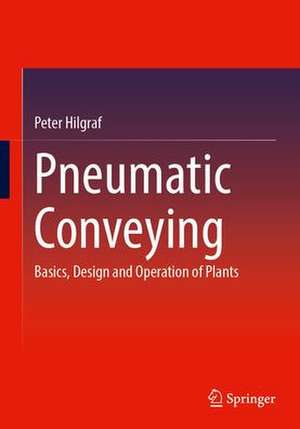Pneumatic Conveying: Basics, Design and Operation of Plants
Autor Peter Hilgrafen Limba Engleză Hardback – 17 ian 2024
Bulk materials are processed and refined in many industrial plants. They are transported back and forth between the various process steps. If bulk materials are dust-fine to coarse-grained, they can be transported pneumatically through pipelines with flowing gas - over distances of several metres to several kilometres.
This book introduces the basics of pneumatic conveying, the construction of plants and their operation. The first three chapters deal with the physical properties of the bulk material and the conveying gas as well as their behaviour in gas-solid systems. The following chapter describes the application of these basics in pneumatic conveying: starting with different flow forms, via processes at the plug, up to pressure loss in pneumatic conveying lines. The following sections are devoted, among other things, to calculation approaches for the transfer of test models to large-scale systems, as well as to modern dense-phase conveying methods in which material to be conveyed moves at low speed in the form of threads, plugs or flowing. Separate chapters deal with the design of pneumatic conveying systems and various forms and causes of their wear.
The book offers calculation examples for many topics and is state of the art. It is aimed at engineers, plant constructors and operators of product lines with pneumatic conveying. They benefit from the author's decades of experience in the development and design of plants with new conveying processes.
Preț: 1135.98 lei
Preț vechi: 1385.35 lei
-18% Nou
Puncte Express: 1704
Preț estimativ în valută:
217.40€ • 224.58$ • 180.93£
217.40€ • 224.58$ • 180.93£
Carte disponibilă
Livrare economică 05-19 martie
Preluare comenzi: 021 569.72.76
Specificații
ISBN-13: 9783662672228
ISBN-10: 3662672227
Pagini: 464
Ilustrații: XXIII, 464 p. 262 illus., 68 illus. in color.
Dimensiuni: 168 x 240 mm
Greutate: 1.23 kg
Ediția:1st ed. 2024
Editura: Springer Berlin, Heidelberg
Colecția Springer
Locul publicării:Berlin, Heidelberg, Germany
ISBN-10: 3662672227
Pagini: 464
Ilustrații: XXIII, 464 p. 262 illus., 68 illus. in color.
Dimensiuni: 168 x 240 mm
Greutate: 1.23 kg
Ediția:1st ed. 2024
Editura: Springer Berlin, Heidelberg
Colecția Springer
Locul publicării:Berlin, Heidelberg, Germany
Cuprins
Introduction.- General basics.- Gas/solids systems.- Basics of pneumatic conveying.- Special calculation approaches, scale-up.- Modern dense phase conveying methods.- Bulk material locks.- Wear in conveying systems.- Design of a conveying system.
Notă biografică
Peter Hilgraf has been working in this field in industry for 40 years. His responsibilities include development, research, plant design and product line management. In particular, he has developed new conveying methods, e.g. FLUIDCON, as well as models and calculation methods for plant design.
Textul de pe ultima copertă
This book introduces the basics of pneumatic conveying, the construction of pneumatic conveying systems and their operation. The first three chapters deal with the physical properties of bulk materials and conveying gases as well as the general behaviour of gas-solid systems. The following chapter describes the application of these fundamentals to pneumatic conveying: starting with various flow forms and processes at the plug and ending with a detailed description of the pressure loss in pneumatic conveying lines. The subsequent sections discuss, among other things, calculation approaches for transferring the measurement results from test plants to large-scale plants as well as modern dense phase conveying methods in which the material to be conveyed moves at low speed in the form of strands, plugs or as a flowing fluidised bed. The book concludes with a chapter in which a complete pneumatic conveying system is designed as an example and a chapter on the various forms and causes of wear in such systems.
The work offers a large number of calculation and application examples and is state of the art.
The contents
Introduction.- General basics.- Gas/solids systems.- Basics of pneumatic conveying.- Special calculation approaches, scale-up.- Modern dense phase conveying methods.- Bulk material locks.- Wear in conveying systems.- Design of a conveying system.
The target groups
The book is aimed at engineers, plant constructors and operators of product lines with pneumatic conveying.
The author
Peter Hilgraf has been working in the field of bulk solids process technology in industry and academia for 40 years. His tasks in this field include development, research, dimensioning of plants and product line management. In particular, he has developed new conveying methods, e.g. FLUIDCON, as well as models and calculation methods for plant design.
The translation was done with the help of artificial intelligence. A subsequent human revision was done primarily in terms of content.
The work offers a large number of calculation and application examples and is state of the art.
The contents
Introduction.- General basics.- Gas/solids systems.- Basics of pneumatic conveying.- Special calculation approaches, scale-up.- Modern dense phase conveying methods.- Bulk material locks.- Wear in conveying systems.- Design of a conveying system.
The target groups
The book is aimed at engineers, plant constructors and operators of product lines with pneumatic conveying.
The author
Peter Hilgraf has been working in the field of bulk solids process technology in industry and academia for 40 years. His tasks in this field include development, research, dimensioning of plants and product line management. In particular, he has developed new conveying methods, e.g. FLUIDCON, as well as models and calculation methods for plant design.
The translation was done with the help of artificial intelligence. A subsequent human revision was done primarily in terms of content.
Caracteristici
All physical principles for use in pneumatic conveying systems
Current findings on the development and design of pneumatic conveying systems
With many calculation examples
Current findings on the development and design of pneumatic conveying systems
With many calculation examples
